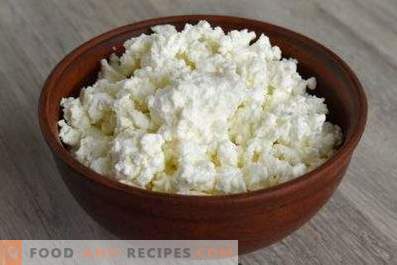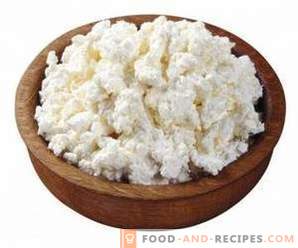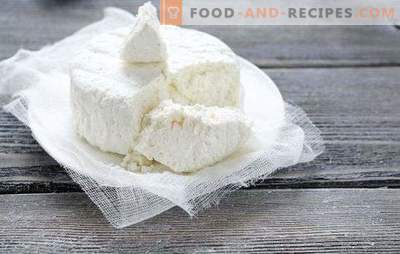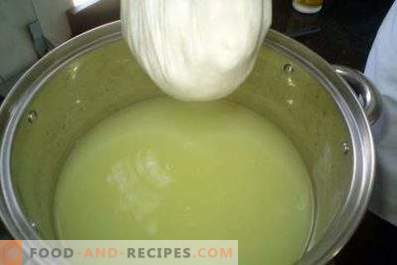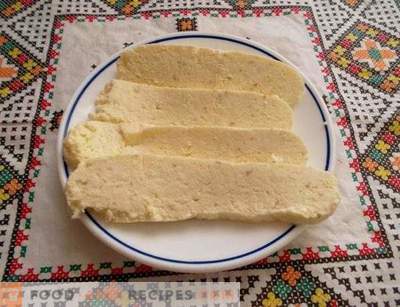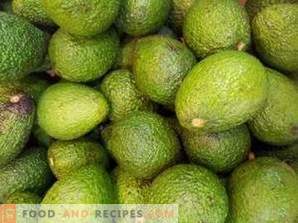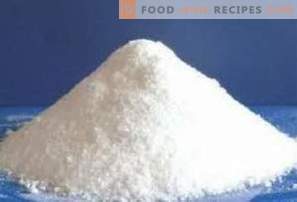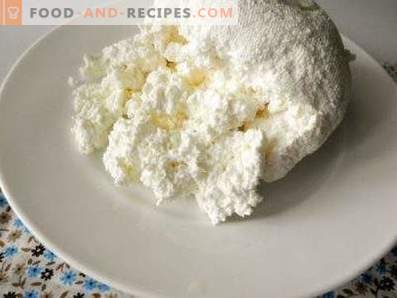
Fresh high-quality cottage cheese is a concentrate of all the beneficial properties of milk, a natural source of high-grade milk protein, which has no contraindications, is well absorbed, and therefore absolutely indispensable in children's and dietary kitchens. On the basis of cottage cheese there are a large number of recipes, but the most useful way to use it is to use in its natural form.
Any preliminary preparation of food greatly facilitates the life of the hostess, saving time and money, and allows to diversify the family diet. The only obstacle to freezing can be only the limited size of the freezer.
Problem of choice
Home-made juicy yellowish cottage cheese is much more appetizing than a shop. But choosing a cottage cheese, we must remember that the rate of reproduction of Escherichia coli in the cottage cheese, which is a breeding ground for bacteria, is much higher than in other dairy products.
When choosing cottage cheese, everyone is guided by personal preferences. The more cottage cheese is pressed and the less fat it is, the more crumbly it is. When buying cottage cheese, you need to remember that:
- heterogeneous structure, layers of different colors and densities may indicate that the proposed product is its mixed residues;
- the product, although it is fermented milk, should not have a pronounced sour smell and taste;
- the probability of pathogenic organisms entering the product weighed in is always much higher than in an hermetically packed industrial method, and its shelf life is much less;
- cottage cheese is a perishable product, therefore it has limited shelf life: you should ask about the purchase.
Each seller must have a certificate confirming the quality of the goods.
“Terrible” interest
Horror stories about the dangers of fat cottage cheese have no soil:
- an increase in the content of “harmful” cholesterol in the blood by 80% depends on metabolic disorders and only by 20% on the composition of consumed products;
- no one explains what “excess consumption” of cottage cheese means: with all the love for it, more than 200 g of product per day and every day nobody eats, therefore the product does not pose the slightest threat to people, even those suffering from kidney diseases.
The presence of natural milk fats is a necessary condition for fat-soluble vitamins of cottage cheese.
What we have, then store
If the product is stored in the open form in the refrigerator for more than 3 days, it should be thermally processed: make cheesecakes, dumplings or a casserole. Cottage cheese, which is stored improperly, can be a source of pathogenic bacteria and cause serious poisoning. Therefore, excess curd can and should be frozen.
The statement that frozen foods are harmful is a myth. The freezing of cottage cheese is the easiest and most popular way of its long-term storage. Fast freezing and storage at low temperature allows you to fully preserve almost all the vitamins and minerals contained in it. In some countries, cottage cheese is frozen even on an industrial scale to stabilize prices in the winter. The main requirement for freezing is to avoid sudden changes in temperature. Freezing can not destroy pathogenic microbes and can in no way improve the quality of the curds already purchased. It only slows down the processes due to which it deteriorates in natural conditions. The principle of freezing - preserving the product in its original form.
Since re-freezing of any products is not recommended, the entire volume of existing cottage cheese (preferably without adding salt, sugar or spices) should be hermetically packaged into portions of single consumption: just as much as you might need for cooking.
It is believed that for safe storage in the cold, fast (so-called shock) freezing is required at the lowest possible temperature of -35 ºC, which can be easily organized in modern household refrigerators. The camera should be prepared several hours before the intended freezing, including the maximum cold, so as not to violate the storage conditions of other products.
“Recovery Work”
A loaded freezer works more efficiently than a half-empty one due to the lack of air circulation.
High-quality freezing lasts at least 5-6 hours. Even a properly packaged product loses quality over time. It is not recommended to store the cottage cheese in the freezer for more than 2 months.
The optimal shelf life of the product in frozen form is one month. Exceeding this period leads to the loss of its consumer qualities: the thawed cottage cheese takes on a powdery appearance and completely loses its taste, although it does not cause any noticeable harm to the body. Long-term freezing will simply lead to the inevitable loss of moisture. The probability of drying out is much lower if you carefully remove all the air from the plastic bags with cottage cheese. The higher the fat content of the curd and the lower its content of whey, the less freezing will affect the quality. Exaggerate the "overdried" cottage cheese can be mixed with fresh fatty cream or soaked in milk for 2 hours.
Among nutritionists there is no consensus about the speed of defrosting cottage cheese. Most of them tend to slow defrosting. This can be done quickly by immersing its hermetic packaging in a bag in hot water.
In which container to keep cottage cheese
Ideal packaging for freezing cottage cheese are vacuum or simple plastic bags, containers or trays made of plastic that can be put on each other for a more rational use of the chamber volume. It is important to place the cottage cheese in the chamber so that the product does not absorb unwanted odors.
Distributing products in the freezer, they should be rationally sorted into groups. Ideally, raw and finished products are stored separately. It is better to indicate the date of freezing of each package with a marker.
